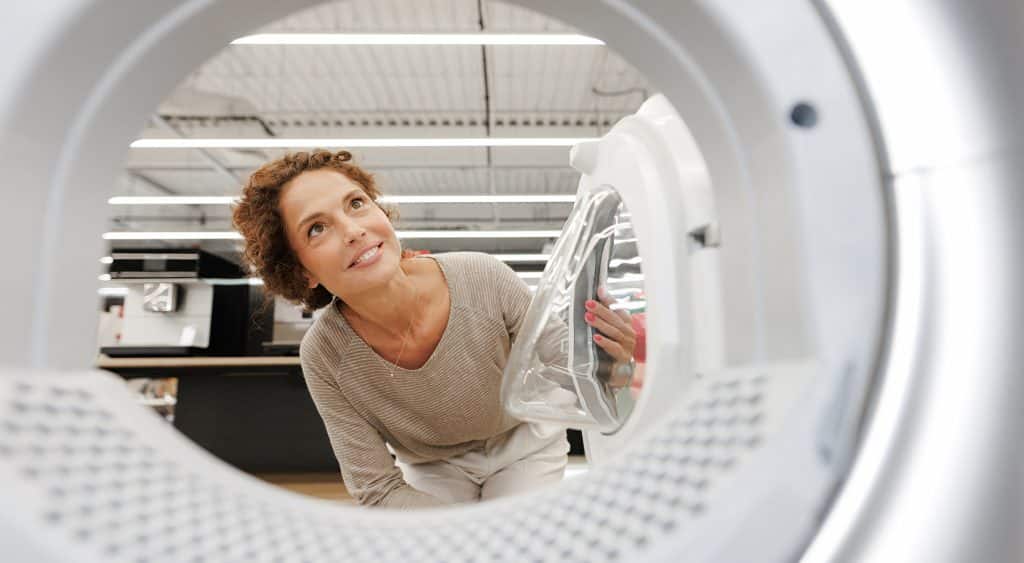Which washer should I buy?

Doing laundry is nobody’s idea of fun, but thankfully modern technology makes it easier. Gone are the days of scrubbing wet garments on a washboard or beating them with wooden paddles.
If you’re buying a new washing machine, you want it to be good value, durable and fit for purpose. But with so many features and options, which machine is right for you? Let’s start by comparing front and top loaders.
Front loader
Front loaders generally cost more to buy, but use less energy and water, so they’re usually cheaper to operate.
Front loaders gently pick up the clothes and drop them over and over in the water in a tumbling action.
A downside is that using less water can reduce their rinse performance and they often have long wash cycles, although many have a fast wash option.
If you use solar-heated water, you’ll need a machine with both hot and cold-water inlets. That’s because most front loaders have internal water heaters, so a machine that only has a cold-water inlet will negate the energy benefits of your solar hot water.
Pros:
✅ More energy efficient and cheaper to run
✅ Gentler on clothes
✅ Strong wash results
✅ Generally use less water and detergent
✅ More programs and higher temperature options
✅ Higher spin speeds, so clothes dry quicker
Cons:
❌ Typically higher upfront cost
❌ Longer wash cycles that can be difficult (or impossible) to interrupt
❌ Can be noisier
❌ Heavy and harder to move
❌ Rinsing performance can suffer due to low water use
Top loader
Top-loading machines have a top-mounted lid through which you add and remove your clothes. Top loaders float the clothes in water and wash them by moving them around with an agitator or impeller.
They’re usually cheaper to buy, but they can be harsh on clothes and may not wash them as well. They also use more water, detergent and energy, so ongoing costs are higher.
Pros:
✅ Cheaper to buy and easier to move
✅ Shorter wash cycles
✅ Wash cycles can be interrupted to retrieve items or add more clothes
✅ Generally rinse clothes better
Cons:
❌ Harsher on clothes
❌ Use more detergent, water and energy
❌ Higher ongoing costs
Other factors to consider
Once you’ve decided on a front loader or top loader, you still have plenty of decisions to make. Washing machines come with a range of features, so it’s important to consider your needs.
Capacity
Washing machine capacities can range from 5kg to more than 18kg, so find one that matches your usual laundry loads.
Don’t pay extra for larger capacities if you only do a few small loads per week, but don’t buy a smaller machine if you’re regularly washing big family-size loads. A sopping wet bath towel can weigh from 1kg to 4kg, so use that as a guide, or weigh a typical basket of clothes on the bathroom scales to give you an idea.
Space
Where’s your machine going to go? If it’s under a benchtop, then a top loader is a no-no. Consider whether you need to access your hot water tap and where your other appliances and fixtures are placed.
If you have limited space, a front loader may be best as you can stack your dryer on top. Before you go shopping, grab your tape measure and note the amount of available space. Think about how close your machine is to your living areas. Front loaders can be louder, so will that be an issue for you?

Energy and water ratings
All new appliances have an Energy Rating Label. The more stars, the more energy efficient the appliance is, but compare apples with apples. A bigger machine may have more stars than a smaller one but will probably use more energy per year.
The Water Efficiency Labelling and Standards (WELS) scheme also uses a star rating system, and more stars means a more water-efficient appliance. A WELS label will often specify how many litres of water an appliance uses.
Brand
The old saying ‘you get what you pay for’ usually applies here. A lesser-known brand may save you money upfront, but will it break down often and cost big dollars to fix? That said, don’t blow your budget on expensive machines with features you don’t need.
The best machine for me
There’s no one-size-fits-all solution, so think about your circumstances and how you’ll live with it day to day. Is it easy to access, practical and better for your water and energy bills? Or are you prepared to pay more for certain features, such as child locks, selectable spin speeds, fast wash, anti-crease options or Wi-Fi connectivity?
Before getting carried away in a sea of flash-looking showroom models, research online and write a list of ‘must haves’ and ‘nice to haves’. That way, you’re more likely to buy a washing machine you’ll be happy with for years to come.

